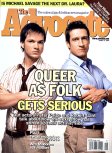 By Michael
Rowe
By Michael
Rowe Excerpted from The Advocate, April 15, 2003
News - Feature Stories - Magazine
The Queer Report
 By Michael
Rowe
By Michael
Rowe
Excerpted from The Advocate, April 15, 2003
Robert Gant and Peter Paige say Queer as Folk has made them reassess their goals and values. In a candid conversation, they report on the show’s evolution—and their own progress in bridging their inner butch and fem.
It’s a slate-gray, icy Sunday afternoon in Toronto, and light outside is obscure. Robert Gant wrapped a Queer as Folk night shoot at 7 a.m. and managed a few hours of sleep before trundling over to Hair of the Dog, a popular restaurant on Toronto’s Church Street whose exterior would be familiar to any devotee of the show. Upstairs, Gant joins a better-rested Peter Paige, who’s already settled at a table, sipping tea.
It’s midway through the filming of Queer as Folk’s third season—Gant’s second season on the show—and the actors are happy to have a brief respite, even if it means a caffeine-fueled brunch with a writer, over the course of which no topic is off-limits, including, among other things, the definition of masculinity.
Even though Paige and Gant in person are at peace with their masculine and feminine sides, the characters they portray (Emmett and Ben, respectively) often represent Queer as Folk’s extremes of nelly and butch. Amid a show that has forced gays to confront vital issues such as HIV-positive–HIV-negative relationships, body culture, sex obsession, drug use, ageism, fidelity, and parenthood, these two out actors have had to explore their own images of themselves and the communities in which they live.
Let’s talk about the new season—it’s unfolding in some interesting
new directions. Where is the story going?
Paige: I think the third season is the best season by far. [Executive producers]
Dan [Lipman] and Ron [Cowen] have said from the beginning that this is the story
of boys becoming men. All of the characters have taken a step forward. The first
season was “Meet these people and their world,” the second season
was “Look what’s happening to these people!” and the third
season is us [helping] each other grow up, challenging each other in these really
intricate, intense relationships. It’s about coming together and coming
apart.
Gant: The new season is definitely about relationships—what works and what doesn’t. Family—what makes a family. Much less drugs- and Babylon-centric.
Ben and Michael are the only visible example of an HIV-positive–negative
relationship on TV. Do you have a sense that you’re exploring a taboo?
Gant: It’s another level of discrimination. It’s a phobia within
the culture.
Paige: It runs both ways, I have to say. I know plenty of positive guys who won’t date negative guys. The prejudices around positive-negative issues are just more ways we keep each other separate and alone and isolated.
Gant: It’s about fear, and the greatest fear is fear of death. In no other situation is the contemplation of living and dying so intertwined with love and sex. And it’s more of a taboo within our culture than anywhere else because of the devastation we’ve endured.
In our first Advocate interview, Peter, you said that you never felt more masculine
and empowered than when you play Emmett. If being ourselves means, for some
of us, walking down the middle of the gender line, why isn’t that something
we celebrate?
Paige: I got a great E-mail from an acquaintance in Los Angeles—notorious
for disliking nelly gay guys—who found himself in an argument with someone
about integrity, and he brought up Emmett. He said, “I realized in that
moment that I had great respect for Emmett and who he is, and I find him attractive
and all these things I never thought I would in a man who was less than hyperbolically
masculine.” I’m so proud to have been a part of that. The nicest
thing that people say to me is that I give nelly queens a good name, and I’m
glad. Nelly queens deserve a good name. The more we challenge ourselves on what
we find attractive and what it means to be a man, the easier it’s going
to be on the generation coming up behind us.
Gant: What’s been exciting for me, as one of these guys who only liked “masculine” guys—in the classic sense of the word—was discovering that I liked “feminine” traits and found them sexy. They turn me on. I realized that my previous perspective was about the fact that I didn’t love that part of myself.
When you say “feminine” traits, are you talking about emotional
traits like compassion and nurturing? Or about overt nonmasculinity?
Gant: It’s such a hard thing to pin down, because they’re such subjective
things. My idea of what that means may be vastly different from what someone
else means. I mean a lightness of freedom, [someone] who doesn’t exist
in the rigid confines of what it has traditionally meant to be “a man.”
There are certain things that…
Paige: Don’t be afraid to say it! You’re dancing around it the same way that people dance around this issue!
Gant: It’s true!
Paige: You’re afraid to say what feminine is! Say it! It’s OK! You’re assuming that people have shame around it and that if you admit you like guys who are emotionally expressive and who use their hands when they talk, people will think it’s odd.
Gant: I own that.
Paige: I’m not blaming you; I’m just saying you’re dancing around it.
Gant: So, you’re right. That’s about my own embarrassment, me assuming that it was something to apologize for. I wasn’t even aware that I doing it, so I’m glad you flagged me for it.
Rowe is the author of the forthcoming interview collection The Most Brilliant Darkness.
[END]